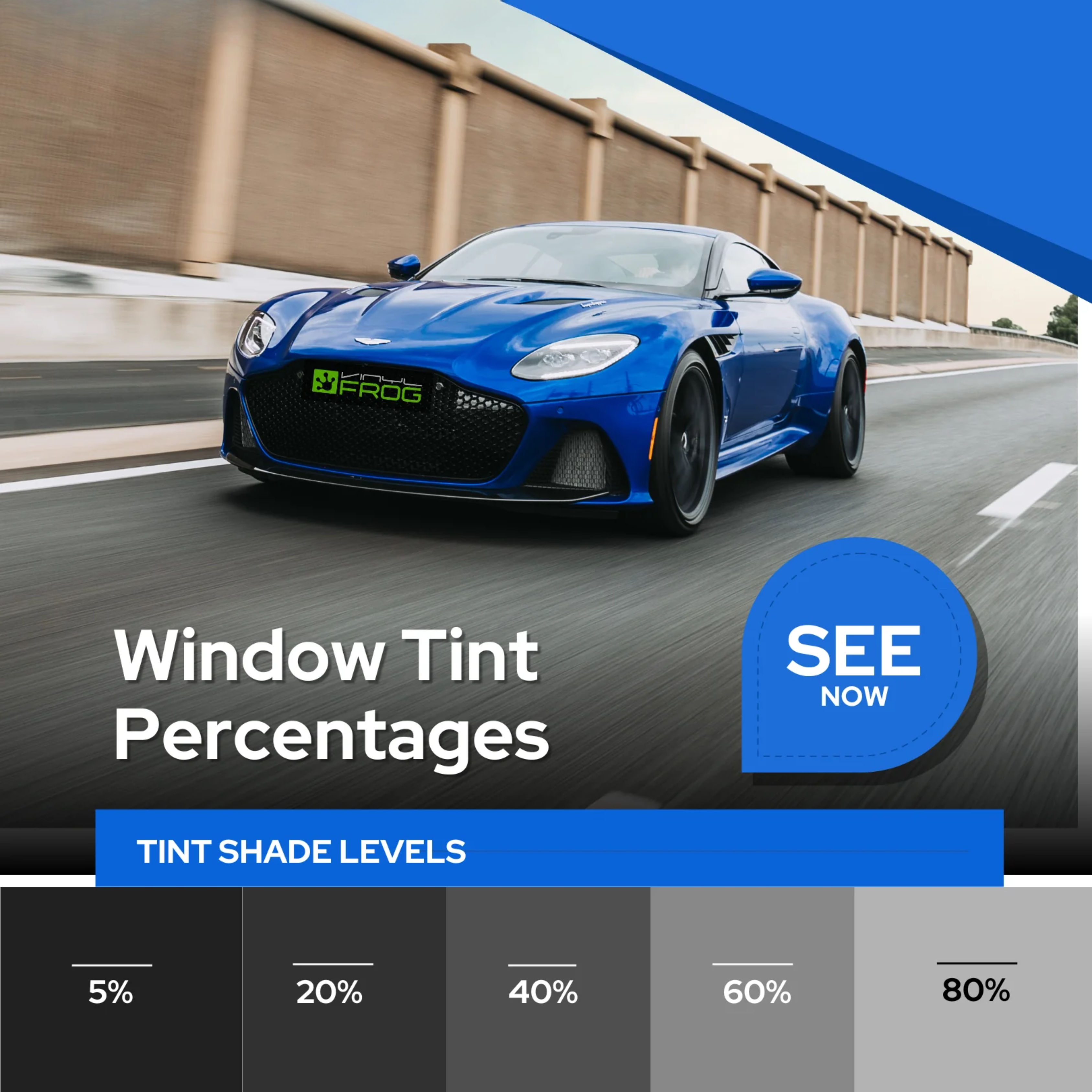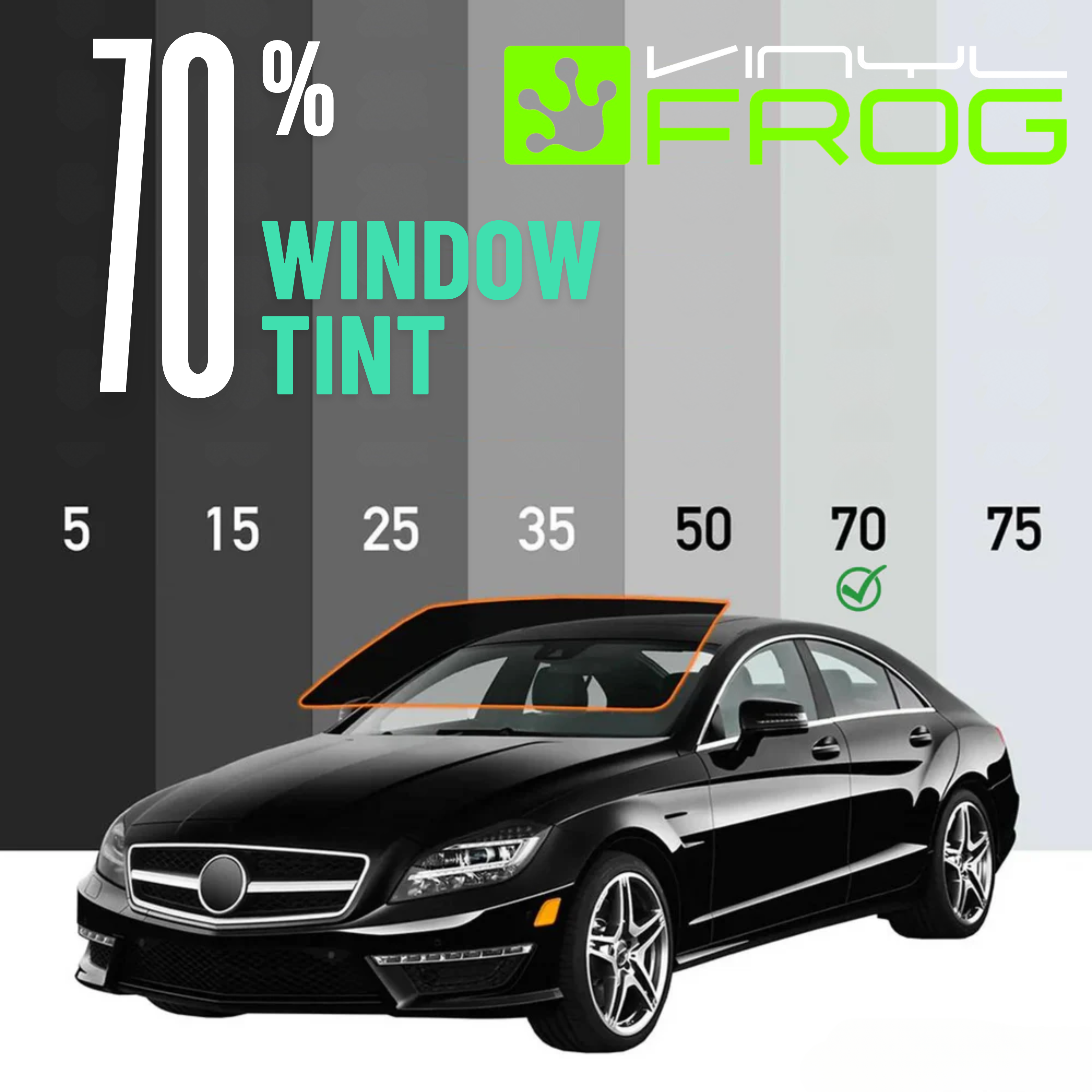Posted By Vinyl Frog On May 18, 2024
Window Tint Laws For Georgia

If you live in Georgia and are considering tinting your car windows, understanding the state's tint laws is crucial. Georgia enacted these laws in 2005 to regulate acceptable levels of tint darkness and reflectivity, ensuring safety on the roadways.
Beyond the aesthetic appeal, tinting offers practical benefits including shielding from UV rays, reducing heat and glare, and enhancing privacy for a more comfortable driving experience.
In this comprehensive guide, we will delve into the specifics of Georgia's window tint regulations, providing clarity for those looking to personalize their vehicles while staying compliant with the law.
Understanding VLT For Georgia Tint Laws
Many individuals often find themselves confused by the concept of VLT and its interpretation within the context of window tint regulations. VLT (Visible Light Transmission) refers to the percentage of visible light that is allowed to pass through a vehicle's windows after the application of window tint.

The VLT percentage is a crucial factor in determining the darkness of the tint and whether it complies with the legal regulations set by the state. For example, if window tint laws specify that front-side windows must allow more than 35% of light in, it means the VLT for those windows must be 35% or higher.
Navigating Window Tint Laws In Georgia
In Georgia, regulations governing window tint for passenger cars, including sedans, SUVs, and vans, are carefully outlined to strike a balance between visibility and privacy. Here’s what the law states:
Laws For Passenger Vehicles
These include sedans, coupes, hatchbacks, and so on.

Cheaper vinyl may seem enticing but may not be as long-lasting showing signs of deterioration way sooner than expected. They also have the potential to damage your vehicle.
- Non-reflective tint is permitted on the top 6 inches of the windshield for all vehicles.
- Front-side, back-side, and rear windows for passenger cars must also allow more than 32% light transmission.
Laws For Multi-Purpose Vehicles
These include SUVs, vans, buses, and trucks. In Georgia, window tint regulations provide flexibility for these vehicles.

- Non-reflective tint is allowed on the top 6 inches of the windshield.
- The front side windows on each side of the driver must allow more than 32% of light to pass through.
- Any darkness tint can be used on the back side and rear windows, providing greater freedom for customization.
These laws also apply to a school bus or any other bus used for public transportation, limousines owned or leased by a public or private entity, and any other vehicle whose windows or windshields have been tinted or darkened before factory delivery or permitted by federal law or regulation.
Window Tint Reflection Laws In Georgia
In Georgia, state laws offer clear guidelines to regulate the application of reflective window tints popular for reducing incoming light and glare. For both passenger and all-purpose vehicles, window tint on frontside, backside, and rear windows must not be more than 20% reflective.

Additional Tint Regulations In Georgia
- Taillights: While not explicitly illegal in Georgia, it is advisable to exercise caution when tinting taillights. If you choose to tint them, ensure that at least 70% visible light can pass through to abide by the law.
- Headlights: Georgia regulations emphasize that headlights should not be covered as this may result in reduced brightness.
- Side Mirrors: State law does not impose restrictions on side mirrors, but it is generally recommended to keep them unobstructed for optimal visibility while driving.
- Restricted Colors: The law prohibits the use of tint colors such as Red and Amber.
- Tint Variance: Georgia's laws allow a 3% light transmission tolerance, providing a slight variance to accommodate variations in tint measurements.
- Certificates: Manufacturers of window tint film are obligated to certify the film they sell in Georgia. Consumers should verify that the window tint applied by their dealer adheres to these certification requirements, ensuring quality and compliance.
- Stickers: The previous requirement for a sticker to identify legal tinting is no longer mandatory in Georgia.
- Exemptions: The vehicles exempted from these laws are those owned and operated by the state and law enforcement, and those related to private detective and private security businesses.
Complying with the regulations is essential for Georgia residents to ensure that their window tinting adheres to all aspects of the law for public road safety.
Medical Exemptions In Georgia
Individuals with specific medical conditions in Georgia have the option to seek an exemption allowing for darker window tint on their vehicles. To initiate this process, applicants must complete an application form, which includes a statement from a state-licensed physician or optometrist.
This statement testifies to the existence of a physical condition necessitating the use of a darker window tint than allowed by law. A standard fee of $10 is required along with the application.

Your application for the exemption to the window tint law must also include information about the vehicle such as its year and make, vehicle identification number, and license plate number. This is submitted to the Department of Public Safety to be approved.
After approval, those with medical exemptions can apply for special window tints. However, the tint must still allow at least 23% of light into the vehicle, with a 3% allowable variance.
It is essential to always keep these documents on hand and shown upon demand by a law enforcement officer. You must also reapply for an exemption after every four years.
Penalties For Non-Compliance
In Georgia, breaking window tint laws can lead to various penalties, including fines and potential legal consequences. A violation of window tint regulations is considered a misdemeanor charge with a fine of up to $1000.

While the severity of penalties can vary, first-time offenders may receive a warning or face a fine ranging from $25 to $100. Subsequent offenses, however, can result in steeper fines, exceeding $200. In more severe cases or for repeated violations, individuals may face imprisonment typically a maximum of 12 months.
To avoid these penalties, it is advisable to ensure that window tints are installed by professional dealers well-versed in Georgia's window tint laws. Seeking guidance from professionals who understand the regulations is a prudent measure to ensure both legal adherence and the desired tinting outcome.
Choosing The Best Tint For Your Vehicle
VinylFrog presents an exceptional range of Heat Rejecting Window Tint Films. Engineered to minimize heat and UV radiation entering your vehicle, these films not only offer protection but also elevate your car's aesthetic appeal.
Available in different VLT percentages such as 70%, 50%, 35%, 20%, and 5%, these films boast durability, scratch resistance, and easy installation, ensuring a flawless and enduring tint application. We offer different roll sizes as well like 5ft x 3.28ft, 10ft, 16ft, 33ft, 49ft, 65.61ft, 82ft, and 98.42ft. You can choose the one that best suits your needs without worrying about wasting the tint film.
With solar control properties, they contribute to fuel efficiency, protect against harmful rays, and enhance your driving comfort. Explore our extensive range that aligns with the regulations in Georgia and enjoy the dual advantages of protection and style with VinylFrog's Window Tint Films. Upgrade your vehicle today!
Frequently Asked Questions
HAVE ANY OTHER QUESTIONS?
Feel Free To Leave Your Questions To Us. We Will Reply You Within 24 Hours!
Final Thoughts
Adhering to Georgia's window tint regulations is crucial for a safe driving experience. To ensure compliance with state laws, familiarize yourself with permissible limits, reflectivity, and color restrictions.
Medical exemptions are available for individuals with specific conditions, subject to a fee and VLT limitations. Penalties for non-compliance include fines and potential legal consequences. By understanding and following these regulations owners can personalize their vehicles within legal limits.














